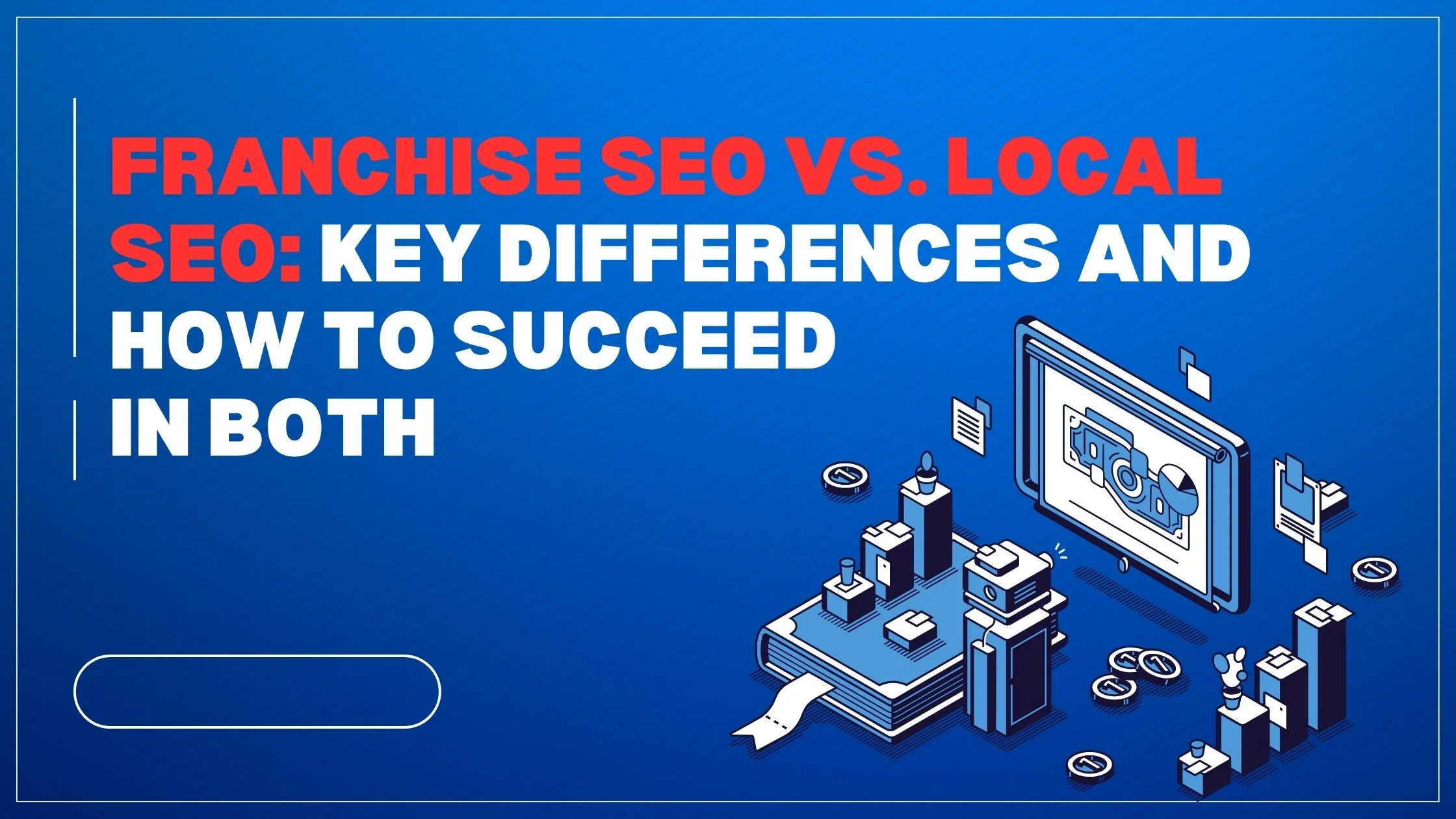Promoting a business may seem simple when it’s a single entity, but for franchise companies, it’s often more complex.
Although a franchise is one brand, it operates through multiple branches across different locations. This creates unique challenges, as geographic factors influence customer behavior and buying patterns, making varied marketing strategies necessary.
The same idea applies to search engine optimization (SEO) for franchises.
Below, we’ll break down the differences between franchise SEO and local SEO, and how to approach each effectively.
Understanding Franchise SEO and Local SEO
SEO is now a core part of most business marketing strategies, helping brands appear at the top of search engine results pages (SERPs) and remain visible to their target audiences.
Franchise businesses typically apply SEO in two ways—broad, brand-wide efforts and targeted, location-specific strategies.
What Is Franchise SEO?
Franchise SEO is used by multi-location businesses to enhance the online presence of the overall brand while also supporting each branch’s visibility.
This strategy works on at least two levels:
- A broad, national (or general) level to promote the entire franchise.
- A localized level to optimize for individual locations.
The goal is to attract both wider audiences and customers searching for specific branches.
What Is Local SEO?
If you’ve ever searched for “restaurants in [city]” or “restaurants near me,” you’ve seen local SEO in action.
Local SEO focuses on improving visibility in geographically relevant search results. It’s essential for businesses that serve specific areas—such as restaurants, shops, or local service providers.
For franchises, local SEO is a key part of the marketing plan. Each branch needs to connect with its nearby community through hyperlocal targeting, ensuring customers can easily find them.
The Value of a Multi-Location Strategy
Franchises have the unique task of maintaining a consistent, recognizable brand while also building meaningful relationships with local customers.
A well-planned multi-location strategy enables franchises to meet both local and overall business objectives. This approach blends elements of franchise SEO and local SEO to create a strong digital presence that benefits the entire brand as well as each individual location.
Relying too heavily on one approach can cause imbalances. Overemphasizing franchise SEO may create distance from local audiences, while focusing only on local SEO can weaken a unified brand image.
For franchises operating in multiple regions, a multi-location strategy is essential. It supports long-term growth, expands market reach, and strengthens competitive positioning.
Franchise SEO vs. Local SEO: Key Differences
A successful multi-location strategy incorporates both franchise SEO and local SEO to create lasting, sustainable growth. While both approaches are crucial, they differ in their focus and execution.
1. Link Building
In franchise SEO, link-building aims to earn high-quality backlinks that strengthen the domain authority of the brand as a whole. This may involve securing links for both the overall franchise and its individual branches, often requiring a national or global outreach.
These backlinks not only enhance brand trust but also boost the search performance of all franchise locations.
Local SEO link-building, however, focuses on securing relevant backlinks from businesses, organizations, and websites within the local community and industry. This can include creating profiles on reputable local directories, industry-specific listing sites, and chamber of commerce pages, as well as collaborating with nearby businesses for content partnerships.
Here, relationship-building and community involvement are key, with quality and relevance outweighing sheer quantity of backlinks.
2. Content
Franchise SEO content tends to be broader in scope while maintaining high quality, focusing on establishing the brand as an industry leader. Examples include blog posts, industry updates, and informative articles addressing common customer queries and highlighting franchise offerings. This type of content supports brand consistency and improves overall search visibility.
Local SEO content, on the other hand, is tailored to specific geographic audiences. This involves creating dedicated service pages optimized for local keywords—such as “furniture Repair in [City], [State]” for an HVAC company—along with localized blog posts and website copy.
A strong local content plan also shows knowledge of the community and may include collaborations with local organizations or businesses to increase reach and relevance.
By doing so, the brand becomes more relatable and appealing to its immediate audience.
Local SEO Strategy for Franchises: 5 Tips to Consider
Implementing franchise SEO services requires a strong focus on local SEO to engage local audiences and secure higher visibility in search results. To identify gaps or missed opportunities for each location, start with a franchise SEO audit. The insights from this audit will help optimize each franchise website, driving local traffic, improving rankings, and boosting brand visibility.
Once your audit is complete, here are five essential local SEO tips from Web Believers to help you strengthen your strategy:
1. Create Dedicated Landing Pages
Build individual landing pages for each franchise location. Instead of one page listing all branches, highlight location-specific services and keywords for better local search performance.
2. Keep Your NAP Consistent
NAP stands for Name, Address, Phone Number. Keep this information uniform across your website, Google Business Profile, social media, and local directories. Inconsistent NAP details can hurt your rankings.
3. Use Location-Based Keywords
Incorporate city- or region-specific keywords into your content. For example, replace “best burgers” with “best burgers in [City].” Include them in your meta descriptions, blog posts, and landing pages.
4. Set Up Online Business Profiles
Claim and optimize your Google Business Profile, Bing Places, and social media pages. This not only boosts visibility but also allows you to collect valuable customer reviews.
5. Get Featured on Local Directories
List your business on trusted directories like TripAdvisor, Yellow Pages, and industry-specific platforms. These listings generate backlinks and enhance your credibility.
Why Choose Web Believers for Franchise SEO?
At Web Believers, we conduct in-depth SEO audits, develop custom strategies for each location, and manage your marketing campaigns end-to-end so you can focus on running your business.
📞 Contact Web Believers today to launch franchise SEO campaigns that generate leads, improve rankings, and strengthen brand presence.
Frequently Asked Questions (FAQs)
Q1: What is the difference between local SEO and franchise SEO?
Local SEO focuses on ranking a single business location in local search results, while franchise SEO involves optimizing multiple locations individually for better local visibility.
Q2: How often should I update my franchise landing pages?
Ideally, review and update them every 3–6 months to ensure keywords, offers, and contact details remain accurate.
Q3: Why is NAP consistency important?
Consistent NAP ensures search engines trust your business information, which directly impacts local rankings.
Q4: Do I need separate Google Business Profiles for each franchise location?
Yes. Each physical location should have its own profile with accurate details to improve visibility in that area.
Q5: How long does it take to see results from local SEO for franchises?
Typically, noticeable improvements appear within 3–6 months, depending on competition and implementation quality.




